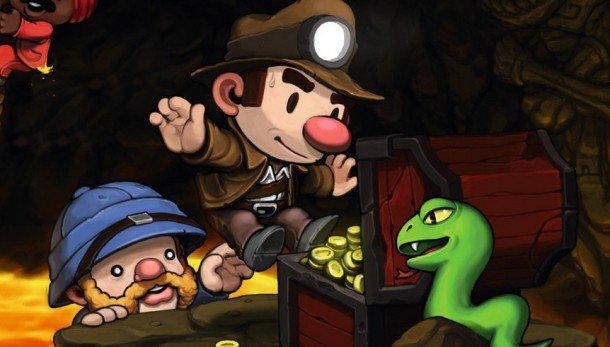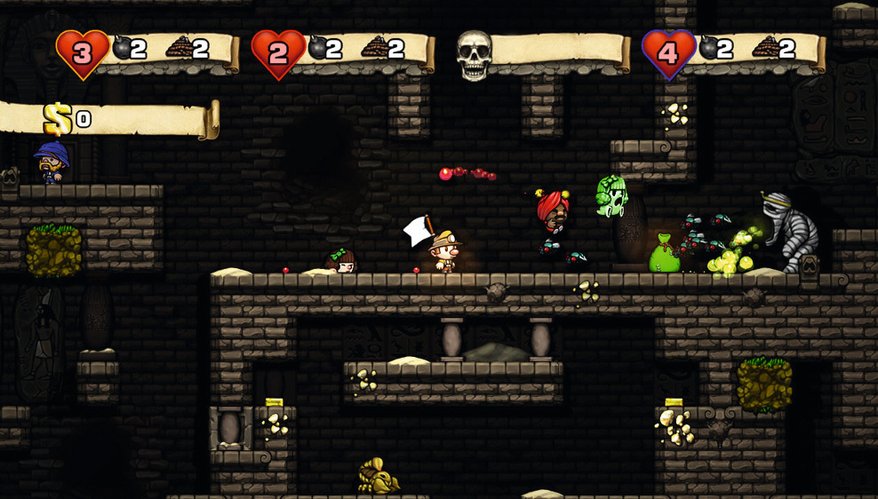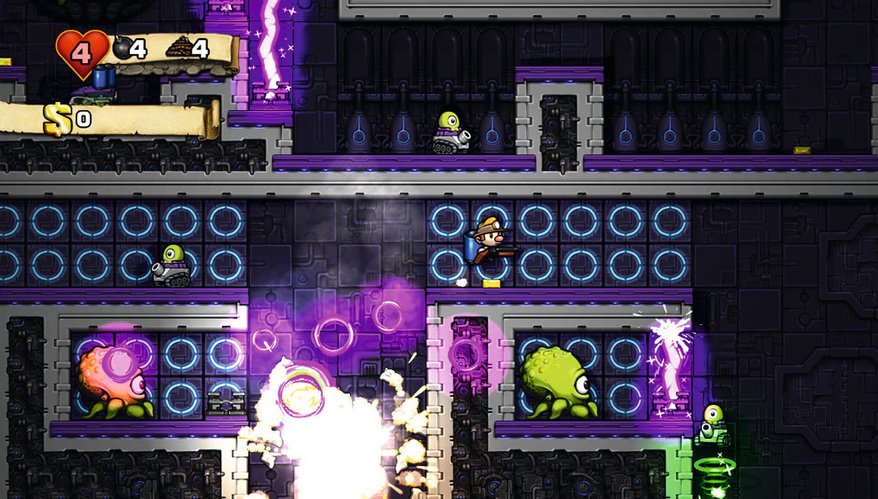
Welcome to the PC Gamer Game of the Year Awards 2013. For an explanation of how the awards were decided, a round-up of all the awards and the list of judges, check here .
Here it is, our game of the year 2013. It's Spelunky! We loved it for its exquisite, focused design. We loved it because of the laughter, and the loud cursing that it inspired. We loved it for a thousand hilarious deaths, and a thousand scary, silly, exciting lives. We loved it for its hidden depths and challenging secrets. We loved it for the shared experiences inspired by the PC-only daily challenge. For all of these reasons, and many more, this is the game that stole our hearts in 2013, and then hid them deep underground underneath a really annoyingly placed bat.
CHRIS It took a few months of dedicated advocacy from my friends, but I'm glad I finally found out what the fuss was all about. Spelunky is an astonishingly well-designed adventure generator. It demonstrates that it isn't technology that matters, at the end of the day, or even mechanical complexity – it's ideas and execution.
TOM Spelunky is a wonderful demonstration of the powers of randomisation. It should be a benchmark for designers who want to make their games endless. Its shifting dungeons constantly turn up challenging new formations, and it's packed with secret worlds and advanced challenges for experts. I am certainly not an expert, but I have had an amazing time playing in co-op. With a few friends at your side, it's a noisy and hilarious blame-a-thon, rife with accidental betrayal and moments of desperate heroism. We've cheered, laughed and screamed ourselves to exhaustion, and we'll be doing it again and again in the years to come. At a glance you'd never guess how good Spelunky is, but it's a quiet classic, and the best game on PC this year.
CORY My favourite games have a way of teaching me difficult lessons. Spelunky's lesson, which I'm still learning, is 'slow the hell down.'
I try to approach it like a normal platformer, racing against the clock to make jumps over spikes and bounce off spider's heads. And I fail, over and over and over. Because Derek Yu's game isn't a platformer, and it isn't a race – though when Death shows up, you better believe I'm going to run for my life. Instead, it's a perfectly measured mix of pacing and permadeath that somehow keeps me reloading after every cheap ending. I'm still learning how to play it – how the intro message about hating snakes means there's a snake pit in the level, and a pickaxe hiding at its bottom. Or how the angle of a bat's descent can be used to catapult my jump to new heights.

Here's an admission: I still haven't beaten the game yet. And I certainly haven't succeeded in any of its Daily Challenges, although watching others' recorded playthroughs of these is a better teaching tool than any wiki or walkthrough. But some day I'll make it to the bottom of this constantly-shifting cave from Hell. And then I'll die a random, stupid death, and do it all over again.
The biggest gaming news, reviews and hardware deals
Keep up to date with the most important stories and the best deals, as picked by the PC Gamer team.
PHIL When I left the Xbox 360 version of Spelunky, I'd hit a crippling state of being just good enough at it to be annoyed by how bad I was. Even the smallest mistake in the Mines would prompt me to restart. I knew that I could do better, and that I'd have to if I wanted to ever complete the game, but the frustration of this pursuit for perfection ultimately drove me away from the game.
The PC version's Daily Challenge changed that completely. With a single shot at each day's seed, each run took on a new significance. Where before a snakebite on 1-1 would lead to a deliberate suicide and restart, now it was a reminder to redouble my caution and an opportunity to improve my technique. It was the PC release that taught me to roll with Spelunky's unpredictability, and it was that lesson that let me eventually complete the game.
EVAN Spelunky is our Mario. It hasn't had the same impact (although it's fun to imagine what gaming would be like if Spelunky had been released in '85), but it's far and away the most important platformer to ever grace the PC. As an FPS player, what I appreciate most is how well tuned the subtleties of movement, distance and danger are in Spelunky – the agility and needle-threading that happens when you're pushing yourself to get that extra gem, rob every store, or reach Yama with an eggplant as your only item. That, and I just love the sound it makes when I pick up gems, ugh. It's immediately brain-tickling.

TONY I'm always surprised people don't talk more about what a great spectator game Spelunky is. The threats are obvious and urgent, the action varied, accessible and non-stop. At parties, on someone's big TV, I can watch for hours as others run around, shriek, kiss pugs and die. This is just as well, because I'm not actually any good at it myself. Never mind: I respect it hugely. I love the magic of procedural games, and I love that someone has somehow channeled that magic into the familiar strictures of the platformer, to create a game that is at once cute, homicidal and infinite.
TYLER I'm just bad enough at Spelunky to be emotionally crippled every time I try to play. I'm impatient. I bunny hop around like it's Counter-Strike. I take leaps of faith without looking below. I don't value my inventory. And then I die. And cry. But at least I can't yell “BS!” The randomisation can be cruel, but the fantastic generation algorithm and consistent platforming put me in control of my fate. I abuse that control because I'm too eager to see what's next.
I am exactly the wrong person to play Spelunky, but luckily for me I can live vicariously through my friends. Like Tony, I love watching livestreams, and I'm in awe of players who can coolly make decisions while disarming traps and whipping spiders. Watching them struggle is like watching a Japanese gameshow contestant stumble through an obstacle course designed for maximum humiliation: harrowing, hilarious, and endlessly entertaining.
PC Gamer is the global authority on PC games—starting in 1993 with the magazine, and then in 2010 with this website you're currently reading. We have writers across the US, Canada, UK and Australia, who you can read about here.


